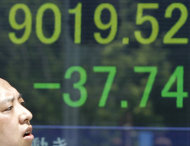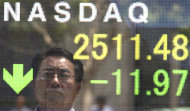MILAN (AP) — Downbeat economic news from around the world renewed worries over the state of the global economy on Thursday and hit already fragile confidence in stock markets.
Investors are worried about both the debt situation in both the U.S. and Europe and the pace of the global economic recovery following a run of weak economic data.
Thursday's news did little to alleviate those concerns.
"Equities are sitting broadly lower .... as market participants worry about the global economic outlook," said Ben Critchley, a sales trader at IG Index.
In Japan, the finance ministry said July exports fell 3.3 percent from a year earlier to 5.78 trillion yen ($75.6 billion) as a result of the strong yen and the ongoing impact of the March 11 earthquake and tsunami.
In Britain, official statisticians reported that retail sales rose by only 0.2 percent in July from the month before. That was down on June's equivalent rate of 0.8 percent and below market expectations for a 0.4 percent rise — in another sign that the British economic recovery is running out of steam.
In the United States, consumers paid more for gas, food and clothes last month, pushing prices up by the most since the spring. The Labor Department said Thursday that the Consumer Price Index rose 0.5 percent in July.
Separately, the Labor Department said the number of people applying for unemployment benefits rose back above 400,000 last week. Still, the four-week average, a more reliable gauge of the job market, fell to the lowest level since mid-April.
High unemployment is a major reason why growth in the U.S. has stalled and jobs data is carefully monitored for any changes.
Thursday's figures appeared to echo an assessment earlier from Morgan Stanley that the global economy is dangerously close to a recession. The bank cut its global GDP growth forecasts to 3.9 percent in 2011 and 3.8 percent in 2012, from 4.2 percent and 4.5 percent, respectively.
"It won't take much in the form of additional shocks to tip the balance," Morgan Stanley said, reserving some optimism due to the health of the corporate sector and expectations that central banks will take more preventative action.
Given the fairly gloomy economic backdrop, stocks have taken a battering Thursday, with banks leading the retreat.
Britain's FTSE 100 lost 2.75 percent to 5,185.19 while Germany's DAX fell 3.86 percent to 5,719.28. France's CAC-40 was down 3.07 percent to 3,154.57.
Wall Street was poised for a similarly downbeat session — Dow futures were down 1.7 percent at 11,188 while the broader Standard & Poor's 500 futures fell 2 percent 1,165.
Investors are also keeping a close watch on developments on Europe after a meeting this week between French President Nicolas Sarkozy and German Chancellor Angela Merkel did little to assuage concerns that Europe is managing its debt crisis, which has already led to bailouts for Greece, Ireland and Portugal.
Fears that the crisis may hit Italy and Spain contributed to huge turbulence on stock markets last week.
A bond-buying program by the European Central Bank appears to have calmed fears that the eurozone's third and fourth largest economies will find it difficult to raise money in the bond markets. Both countries' ten-year bond yields have fallen by over a percentage point below 5 percent, which is considered manageable.
Given the more benign European debt backdrop, the euro has eked out gains over recent sessions. By mid morning London time, the euro was down 0.2 percent at $1.4396.
Earlier in Asia, Japan's benchmark Nikkei 225 closed down 1.3 percent to 8,943.76 after the export figures, while South Korea's Kospi lost 1.7 percent to 1,853.08.
Hong Kong's Hang Seng shed 1.3 percent at 20,016.27, while mainland Chinese shares lost ground for a third straight trading day on concerns over a possible interest rate hike and new restrictions aimed at cooling housing prices.
The Shanghai Composite Index lost 1.6 percent to 2,559.47 and the Shenzhen Composite Index lost 1.8 percent to 1,142.91.
Oil prices also tanked alongside equities. Benchmark crude for September delivery was down $2.64 to $84.94.



No comments:
Post a Comment